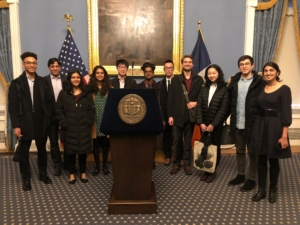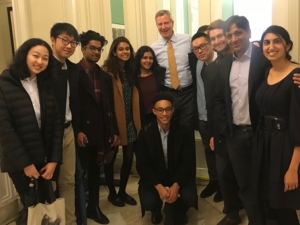From high rankings and world-class facilities to admission of only the best and brightest students, there are a lot of factors that play into the notoriety of a top business school. Another trademark: big shot faculty. Premier business schools such as The Wharton School at the University of Pennsylvania, for instance, maintain faculty rosters with names like Adam Grant and Jeremy Siegel. Superstars are what you might call them — in academia anyway.
Whether they’re as highly acclaimed as Grant and Siegel or not, business school faculty are often research-generating machines. Study after study, one journal article after another, they create and disseminate new knowledge about the inner workings of business. And, as it turns out, there’s more for undergraduate students to gain from them than just classroom learning and office hours. Just ask NYU Stern’s Hayden Edelson.
STERN UNDERGRADS COLLABORATE WITH THE CITY OF NEW YORK
This semester, Edelson and a group of seven other Stern undergraduate students are serving as research assistants to professor Arun Sundararajan, considered by many to be the top authoritative voice on the gig economy and the potential end of employment as we currently know it.
To be sure, the label “research assistant” does not equate to low-level grunt work for Edelson and his fellow student researchers. Part of the study, which focuses on New York City’s changing workforce and how officials can prepare for the growing gig economy, has included meetings with New York City’s Deputy Mayor Alicia Glen and Mayor Bill de Blasio.
For Edelson and the others, the experience is made possible thanks to the Stern Undergraduate Research Program. SPUR, as it’s called, gives undergraduate students a chance to collaborate with professors on scholarly research for academic credits. At the beginning of each semester, SPUR’s database is filled with research opportunities for students to browse through then apply to be a part of a research team.
In Edelson’s case, the research of choice is a collaborative study with the city of New York — primarily with Glen’s office — aiming to provide evidence-based program and policy recommendations for the sharing economy. Or, “crowd-based capitalism,” as Sundararajan calls it in a recent book he penned.
‘BEYOND CASE STUDIES AND HYPOTHETICALS’
For undergraduates, gaining real-world experience is crucial. Whether that’s found through internships, traveling abroad, or serving in a leadership role for on-campus activities, it’s the experience that counts.

NYU Stern professor Arun Sundararajan accompanies a group of undergrad students doing research at the office for NYC Deputy Mayor Alicia Glen
For Edelson, working alongside Sundararajan has brought new meaning to this notion as he has spent the better part of this semester getting his hands dirty in real-world, real-time data.
“We kicked it off with preliminary research. Professor Sundararajan assigned us to groups to work on different tasks,” Edelson tells Poets&Quants for Undergrads. “I was in the group analyzing market responses to the rising demand for benefits solutions for independent contractors and freelance workers.”
The findings of that preliminary research was then presented by the students before Deputy Mayor Alicia Glen and office staff.
“This is a really good opportunity to dive deep into things affecting real people’s lives in major urban centers and to analyze trends in the workforce,” says Edelson, who is a finance major with a track in real estate and a double minor in urban design and psychology. “I think the standout moment for us so far was going to City Hall. The Deputy Mayor came to speak to us with her staff and she really emphasized how big of an issue this was becoming. Then, we bumped into Mayor de Blasio and even he was taken aback by the work we are doing.
“That made it real for all of us,” Edelson continues. “This will have legislative impact in one of the largest cities in the world and will impact people with all different levels of income and backgrounds. We’ll have a significant impact on a number of people in a really tangible way.”
More recently the students have started training for in-person interviews as Sundararajan prepares to send them out and into the field. In pairs, they’ll meet with corporate human resources representatives, gathering data about benefits packages for their workforce.
“I think this is one of the best ways for undergrads — who spend so much time in classes and working on cases and hypotheticals — to take their studies beyond the classroom and have a premier opportunity to analyze issues in the real world in current time,” says Edelson.
“Classroom learning is extremely important and it gives you the tools necessary to work in a capacity like this, but this experience really elevates things,” he continues. “The opportunity to work with real-world data and real-world information in a significant way makes it much more meaningful.”











